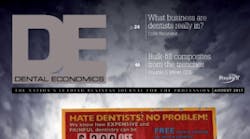You may have heard the Latin expression tempus fugit, which is often translated to “time flies.” A better translation would be “time escapes,” like a fugitive. Either way, time is a fast-moving culprit. If you snooze, you lose, right?
Not so fast. There also are times when it’s best to slow down.
Taking your investment time
Investing is one of those times. We often speak of embracing a patient, long-term approach to managing your money. Why is that? Beyond the ample academic evidence supporting the strategy, I’ve seen it with my own eyes. I’ve met with countless dental professionals who have been saving and investing for decades. Every so often, someone who’s been impatiently playing the market gets lucky and comes out ahead. But most of the successful investors I’ve met have built “sleepy” portfolios of low-cost, indexlike funds allocated according to individual risk tolerances... and putting them on snooze control.
Making big business decisions? Go slow and steady
Your practice development is also often best served when you embrace a patient approach. I’m not suggesting you should stop improving your business! But it’s usually worth sleeping on big decisions before you make them.
If anything, this advice is more relevant today than ever. I remember in the 1980s and 1990s, when consultants would tell private practice dentists that they weren’t competing with one another, but with other ways to spend disposable income - such as at the nearest Mercedes-Benz dealership.
Not anymore. There are so many external business factors, it’s difficult not to feel you must react and restructure your practice at every turn. Corporate dentistry and large group practices, lower reimbursements and higher costs, unknown legislative possibilities . . . these factors and more are contributing to a competitive commoditization of dentistry.
Whether you’re thinking about adding a PPO plan, dropping insurance altogether, increasing hygiene days, relocating your practice, or making any challenging choice, you don’t want to make a rash decision you’ll later regret (or at the opposite extreme, freeze up and make no decision at all).
Having someone help you handle the brakes
Besides taking your time, objective advice can help you maintain your edge. As expressed by Simplicity author Edward de Bono, “An expert is someone who has succeeded in making decisions and judgments simpler through knowing what to pay attention to and what to ignore.”
In that context, it can help to work with a financial advisor who specializes in serving dentists, because your financial best interests extend well beyond simply having a stable investment portfolio. With your professional hat on, your money also is tied up in business decisions large and small: Should you hire that hygienist, purchase 3-D or CAD/CAM technology, add a defined benefit plan, purchase a second office, relocate your existing one, engage a consultant, move your QuickBooks from desktop to online?
Take that office relocation as a case in point. Let’s say your landlord is being a pain, and you’d love to move on. You’ve spoken with a real estate agent who has sworn you can save $1.50 per square foot if you “act now!”
But how do you know whether to stay or go? An advisor who specializes in working with dentists can contribute to making a more informed decision by helping you:
- Assess the challenges - Have you factored in the costs of building a new dental office, overrun estimates, after-tax financing costs, the likelihood that a few patients won’t follow you to your new location, and other logistical hassles?
- Factor in the opportunities - Even with these challenges, a move may still make sense. Depending on where you are in your career, the transitional pain may let you grow faster and according to your own terms, but it’s worth affixing a hard number to these soft ideas.
- Handle the logistics - If you do decide to proceed, it can help to have somebody who can minimize the tax implications and serve as an objective sounding board from start to finish.
In short, even though time is going to remain as fleeting as ever, it’s not always in your best interest to try to keep pace with it. By knowing when you’re better off going slow, you can expect to come out ahead in the end.
Reference
1. de Bono E. Simplicity. Harmondsworth, England: Penguin Group; 1998:2.
J. Haden Werhan, CPA, PFS, joined the Thomas Wirig Doll-affiliated firms in 1998 following a lengthy career managing, consulting, and providing accounting services to dental practices ranging from start-ups, to acquisitions, to large group settings. He has regularly lectured and provided seminars on tax, financial planning, practice management, and practice transitions at the University of California and University of the Pacific schools of dentistry in San Francisco, various dental societies, study groups, and dental supply companies.






